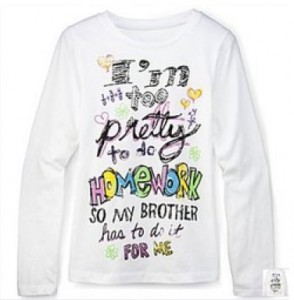Last week, I was fortunate to be invited to the Highlights Magazine press conference announcing the results of their annual State of the Kid Survey. As a kid, my grandfather always sent us subscriptions to Highlights Magazines and we loved them, especially those hidden pictures. Now, my Aunt purchases the magazine subscription for my girls every year, and the tradition continues, we still love looking through them – especially those hidden pictures. So when Highlights emails, I’m likely to respond, and then add in the chance to hear what they learned by polling kids ages 5 and up on issues like bullying, what their parents worry about, and what girls and boys are good at – bam – I am there and all ears.
So first topic: bullying. According to the survey results, 61% of children up to age 12 feel they have been bullied. Highlights dug a little deeper, however, and learned the younger kids define bullying pretty broadly as “being mean.” The older kids, ages 9 through 12, were more likely to define bullying also as unprovoked – in some of the kid’s own words to “hurt or embarrass for no reason.” Not surprisingly, children who had been bullied were also more likely to admit to bullying someone else. Interestingly, when asked how they handle being bullied, 14% said they tried to handle it themself instead of telling a parent or teacher, and boys were more likely to say they tried to bully that person back while girls tried to ignore them. One of the experts at the press conference, Deborah Holliday, a social worker from New Jersey and spokesperson for BullyAlarm.com, noted that the kids are much more likely to tell a teacher than their parent about the bullying behavior – and noted this is troubling because parents need to be actively involved in combating a bullying culture. As a parent of a child who just started Kindergarten, I obviously couldn’t agree with her more, but so far my struggle is getting my daughter to tell me anything about her day when she gets home from school. It’s like I need CIA training in interrogation to get any details. Typically she ” can’t remember,” so I’d be interested in more ideas on how parents can be involved when we are relying upon our tight lipped and exhausted kids to tell us.
Next children were asked what they think their parents worry about. An overwhelming 77% said their parents worry about them, which at least in my house, is certainly the case. Another common response was that their parents worry about money. In this age of the debate between helicopter parenting and free range kids, so many of them wrote about their parents worrying about their safety, them getting kidnapped and murdered and many of their written responses hinted at frustration that their parents aren’t giving them more freedom. In the press packet which included written statements by the kids themselves, one child wrote “They worry about me so much that I get worried about my freedom!” Aside from that being hilarious, it strikes a chord with me between allowing your child to play freely outside in contrast with posts on neighborhood listservs about cars driving slowly behind kids walking home from school and general paranoia from watching the news or one of these cop shows on TV. It also serves as a good reminder to me that these kids really are always listening and they are absorbing our worries and anxieties and to what end – does it help them realize the world isn’t a safety net for them or should we be more careful that there are listening ears around us at all times? Striking the balance between trusting them and giving them independence but keeping them safe must surely be a constant struggle.
And last but not least – the real reason I was eager to hear the results – gender roles.
Spoiler alert – as a mother of two girls – these results weigh very heavily on my heart. The Highlights press release summed it up with this statement: “The 30 questions Highlights asked kids over the last three years have included some surprising differences between boys and girls. In total, they suggested that girls are highly aware of their physical appearance and that affects their current and future vision of themselves and their opportunities.” Recall – we are talking about kids ages 5-12 here. In 2009, survey respondents said that girls are more likely to be asked to do chores than boys. In 2010, boys were more likely to say the best thing about them was their smarts. This year, there was a strong consensus that boys are better at sports than girls and sadly there was no real consensus on what girls are good at doing, the most common answers included hair/makeup (12%), cheerleading/gymnastics (10%), school (8%), cooking and cleaning (5%) and listening (3%).
I am speechless and disappointed and wish I wasn’t surprised. I’m also left wondering what I need to do as a parent to make sure my daughters answer with things like their athletic prowess and their intelligence. And I wonder if it’s about confidence – are we better at raising confident boys than confident girls? Is it a cultural problem as much as an issue of what we teach them at home and at school? Do we talk to girls dramatically differently than boys?
Why is this happening? Surely cultural expectations are a problem if retailers like Forever 21 believe they can turn a profit off selling t shirts to girls with “Allergic to Algebra” as the slogan. Last week Anna Holmes had a wonderful column in the Washington Post about the grave need for girls to pursue careers in science and technology. She wrote: “According to a report released last month by the Department of Commerce, although females fill almost half of the jobs in the American economy, less than 25 percent of jobs in STEM fields are held by women. Even worse, female representation in the computer science and math sector — the largest of the four STEM components — has declined over the years, from 30 percent in 2000 to 27 in 2009.” (STEM being science, technology, engineering and math). Holmes goes on to make the case that the reason women aren’t pursuing careers in these fields begins at a very young age and she quotes an expert:
“We are back to the beauty versus brains saga, in which girls entering middle school feel forced to ask themselves, ‘Do I want to be smart in math, or do I want to be seen as attractive?’ ” says Jennifer Skaggs, a University of Kentucky education researcher and author of the June 2011 paper Making the Blind to See: Balancing STEM Identity With Gender Identity. “If a female is seen as technically competent, she is assumed to be socially incompetent. And it works the other way around.”
So what’s the answer? Talk more with our girls about math and science, work harder at encouraging them to pursue these fields? Spend more time talking with them about the importance of being smart and confident than how cute they look and what outfit they are wearing? What do you think?













